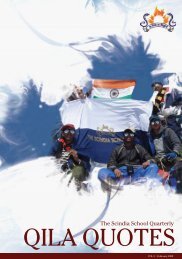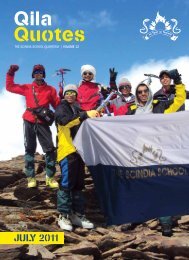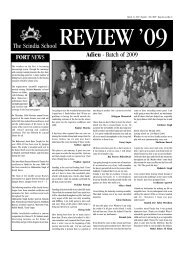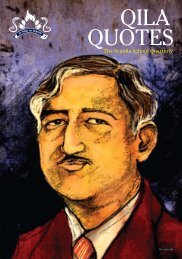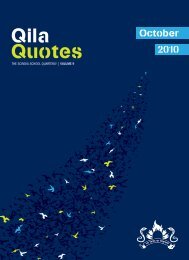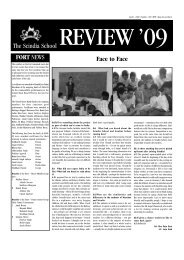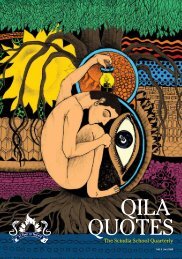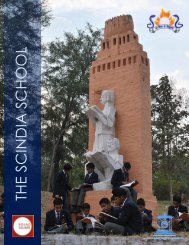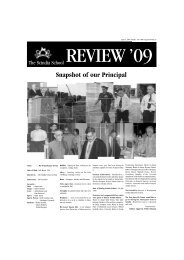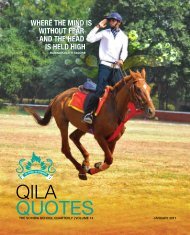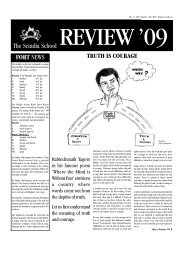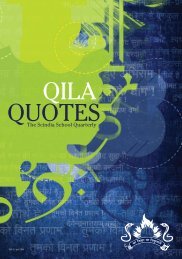6th January 2009 - The Scindia School
6th January 2009 - The Scindia School
6th January 2009 - The Scindia School
Create successful ePaper yourself
Turn your PDF publications into a flip-book with our unique Google optimized e-Paper software.
Interview of<br />
Dr. Sudhir Bloeria<br />
N.K: What made you decide to join the<br />
army<br />
S.B: My father who was in the army had<br />
an orderly called Kamal Singh. He had<br />
taken active part in the ’47-’48war against<br />
Pakistan. He used to tell me stories of how<br />
the bunkers were made, what a trench is<br />
and how they repulsed Pakistani attacks.<br />
Though my father was in the army, it was<br />
actually Kamal’s stories that inspired<br />
me the most. I would imagine myself as<br />
one of the characters in his description.<br />
Though at that time I was just in class IV<br />
or V, I made up my mind to join the army.<br />
N.K: Sir, what made you switch from<br />
military service to civil service<br />
S.B: I joined the army as per my wishes.<br />
Since I was a short service commissioned<br />
officer, I had an option after six years<br />
to either leave the army or to stay with<br />
it. I decided to stay but as a fallback<br />
option I appeared for the IAS entrance<br />
examination and got through. My seniors<br />
in the army and elders at home advised<br />
me to join the civil services. However both<br />
my wife and I were keen that I continued<br />
in the army. Somehow the switch over just<br />
happened.<br />
former Civil Servant, with Namay Kapoor, Editor-in-Chief, Review.<br />
N.K: You have served in J&K at the<br />
height of insurgency. Things are much<br />
better now. Does your book ‘<strong>The</strong> Dying<br />
Terrorism’ deal with the same<br />
S.B: ‘<strong>The</strong> Dying Terrorism’ is mainly<br />
an exercise in record keeping. It tells<br />
how we organized and conducted the<br />
parliamentary and assembly elections<br />
in 1996, after a gap of ten years. You<br />
know human memory is short. Since I<br />
could recall some details and had kept<br />
personal notes of important events, I<br />
wanted to document the entire sequence<br />
of events for posterity. <strong>The</strong> book does deal<br />
with terrorism and related issues also. It<br />
records reasons and events leading to the<br />
rise of terrorism and how we can address<br />
the problem, but primarily it is a record<br />
keeping exercise.<br />
N.K: What according to you can be a<br />
lasting solution to the Kashmir problem<br />
S.B: Unfortunately it is not a problem<br />
within the control of India alone. Whether<br />
you like it or not Pakistan has become a<br />
party in the permanent resolution of this<br />
problem. We in India feel, and rightly so,<br />
that the entire J&K as it existed on 15th<br />
August 1947 is ours whereas Pakistan<br />
wants J&K as a part of Pakistani territory.<br />
So a practical way out has to be found.<br />
As per the newspaper reports, there were<br />
occasions in the past, particularly during<br />
talks between Rajiv Gandhi and Benazir<br />
Bhutto, when outlines of resolution had<br />
been worked out but these could not be<br />
pushed forward. <strong>The</strong>n some understanding<br />
is said to have been arrived at between<br />
Prime Minister Manmohan Singh and<br />
General Musharraf, but that too didn’t<br />
fructify.<br />
A lasting solution would have to be<br />
something that would be acceptable to<br />
both the countries. <strong>The</strong> line of control<br />
(LOC) could perhaps be agreed upon as<br />
the area of influence of the respective<br />
countries. From that premise we can talk<br />
about other things like making the border<br />
porous, facilitating trade and interaction<br />
between the two parts etc. But maintaining<br />
the sanctity of the line of control at this<br />
point of time seems to be a pre-requisite<br />
to a lasting solution.<br />
N.K: According to you what is the<br />
solution to the problem of corruption<br />
S.B: It is a natural principle of life and<br />
science that things flow from top to<br />
bottom. We have given ourselves a<br />
democratic system and it is controlled by<br />
the political executive, so it will have to<br />
start from there. Though corruption exists<br />
at all levels but I firmly believe that if the<br />
political executive is clean, honest and<br />
straightforward then nobody down the<br />
line, be it a politician, a civil servant, a<br />
middleman or a criminal can go beyond<br />
his circle of activities. We now have certain<br />
instruments like the Right To Information<br />
Act, social activistIvism etc which generate<br />
confidence. So if we make suitable<br />
systemic changes and something positive<br />
starts from the top, it will make a lot of<br />
difference.<br />
N.K: What do you think is the biggest challenge for our country today<br />
S.B: <strong>The</strong> other day I was reading an opinion poll in the Times of India and<br />
the question put to the respondents was, “What is the biggest challenge that<br />
India is facing. Is it terrorism or corruption” It was corruption which got 82 %<br />
votes. I completely agree with this. Corruption is an issue with which we have<br />
to deal with great alacrity followed by population management. Of course,<br />
terrorism also needs priority attention.<br />
N.K: You have been a regular visitor to<br />
<strong>The</strong> <strong>Scindia</strong> <strong>School</strong>. What is the magnetic<br />
charm of the school which draws old<br />
boys to it<br />
S.B: In my case the charm lies not just in<br />
the school itself but in the town as well.<br />
I studied here from class IV to XII. So the<br />
formative years of my life were spent in<br />
Gwalior. I like to come back to the school<br />
as I feel happy to be on the Fort. At least<br />
for that week I feel young again. I feel<br />
like sharing with the boys what I have<br />
learnt, and the experiences that I have<br />
accumulated, over the past five decades.<br />
N.K: Is there any particular teacher<br />
whom you still remember<br />
S.B: Not just one, I remember a number<br />
of them with respect and affection. Some<br />
teachers were simply outstanding. <strong>The</strong><br />
then Principal, Mr.K.C.Shukla was already<br />
an institution when I joined. <strong>The</strong>re were<br />
many accomplished teachers like our<br />
Hindi teacher Mr. Devendra Narayan<br />
Verma who was a poet of great repute<br />
and wrote the <strong>School</strong> Song. I remember<br />
many teachers, particularly those who<br />
taught us as well as those who were good<br />
sportsmen.<br />
N.K: Are you in touch with your batch<br />
mates How active are you as a SOBA<br />
member<br />
S.B: I am in touch with my batch mates<br />
and some other old boys for professional<br />
reasons. I often come across old boys who<br />
are in the army. <strong>The</strong>y keep coming in and<br />
out of my state J&K.<br />
We had organized a SOBA chapter two<br />
years ago. We interact fairly regularly<br />
but before that we did not have a SOBA<br />
chapter in J&K. It is difficult for us to get<br />
connected with far away cities. Mr. Jorawar<br />
Singh, a former housemaster and teacher<br />
of <strong>Scindia</strong> <strong>School</strong> is also one of our<br />
members. He is the Principal of a school<br />
in Jammu and we meet quite often.<br />
S.B. Dr. Sudhir Bloeria (Ex Mj ’62)<br />
N.K. Namay Kapoor<br />
16 Interview<br />
VOL 6 | Jan 2010



